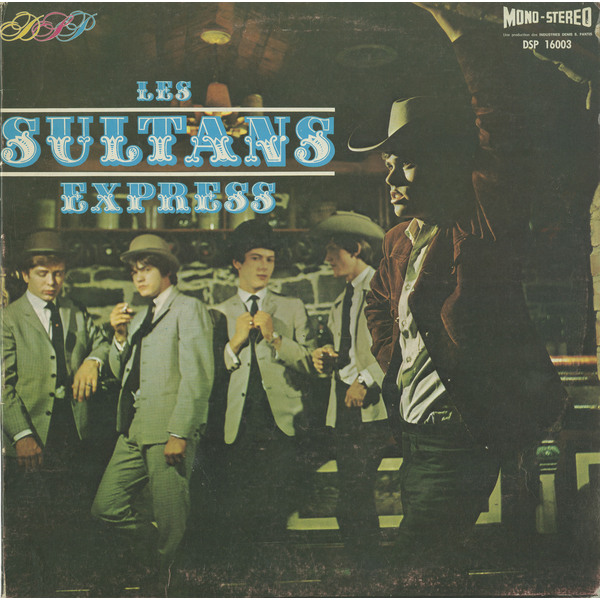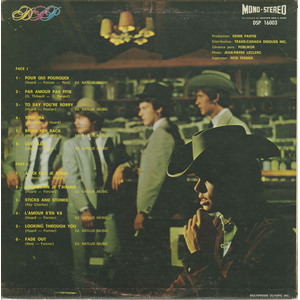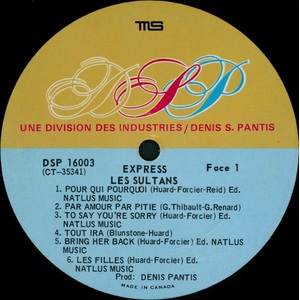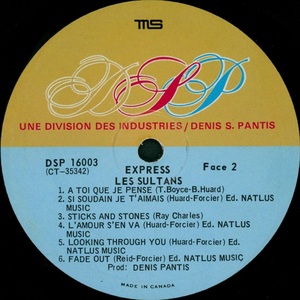Information/Write-up
Formed in Saint-Hyacinthe, Quebec, in 1964, Les Sultans emerged as one of the most iconic French-Canadian pop groups of the 1960s. Blending Beatlemania-inspired rock with the French yé-yé style and American folk-pop, they struck a deep chord with Quebec’s youth during the province’s Quiet Revolution—a time of cultural self-discovery, modernization, and artistic awakening.
Origins: From Les Dots to Les Sultans
The roots of Les Sultans trace back to 1962, when teenage guitarist Claude Reid founded an instrumental combo called Les Dots with classmates Marcel Richard, André Dion, Gilles Henry, and drummer Michel Dufault. Originally emulating British instrumental acts like The Shadows, the group took a major turn in 1963 with the addition of vocalist Bruce Huard, whose charisma and vocal range would quickly become the band’s signature.
By 1964, the band had rebranded as Les Sultans, embracing the full aesthetic of British Invasion pop—tight suits, melodic hooks, and harmonized vocals—while still remaining deeply rooted in the French-language pop tradition. That same year, they were signed to the Fontaine label and began issuing French-language versions of popular rock hits.
Breakthrough and Rise to Fame
Their early local success came with “Toujours devant moi,” a spirited adaptation of The Beatles’ “I Saw Her Standing There,” as well as “Oh Lady” and spirited renditions of Latin standards “Cielito Lindo” and “La Bamba.” Their high-energy performances earned them a residency on the Sherbrooke television program Bonsoir Copains, taking over from The Hou-Lops, and they soon became household names across francophone Quebec.
Under the management of Jean-Guy Labelle, and later Gerry Plamondon and lyricist Gilles Brown, the band scored a series of hits: the reflective “Vivre sa vie,” the teen anthem “On est trop jeune,” and their breakout ballad “Va-t’en,” written by the band and showcasing Huard’s increasingly expressive vocals.
By this time, the lineup included:
Bruce Huard: vocals
Claude Reid: guitar, harmonica
Michel Dufault: drums (later replaced by Pierre Bélanger)
Ghislain Dufault: bass
Denis Forcier: guitar (replacing Gilles Henry)
Peak Success and Artistic Expansion
In 1965, the group signed with Télédisc, produced by the prolific Denis Pantis. Their first release under the label, “Tu es impossible” (a French cover of Them’s “I Can Only Give You Everything”), showcased a grittier garage-rock sound. But it was their 1966 interpretation of Michel Polnareff’s “La poupée qui fait non” that catapulted them to superstardom. This version remains arguably the definitive rendition in Quebec pop history.
Their 1966 full-length LP, Les Sultans, shattered sales records in Quebec and earned them the Best Group of the Year award at the Festival du disque. The album blended adaptations and originals like “L’amour s’en va” and “Pour qui pourquoi,” both penned by Huard and Forcier, reflecting their maturation as songwriters.
Throughout 1966 and 1967, they released a string of hits:
“C’est promis”
“Tout le monde me dit qu’elle est belle”
“Angélique”
“Pardonne-moi”
“À toi que je pense”
English Crossover and Final Chapter
Sensing their ceiling in Quebec, Les Sultans attempted a crossover into the broader Canadian and international markets in 1967. They recorded a suite of English-language songs—“To Say You’re Sorry,” “Bring Her Back,” and “Looking Through You”—culminating in the Express LP. Although musically ambitious, these tracks failed to match their French-language success.
Their final public appearances came in late 1967 and early 1968, culminating in a farewell live album, En personne – Les Sultans à Starovan, and their final single, “En fermant la porte.” By the spring of 1968, Les Sultans officially disbanded.
Legacy
While their time in the spotlight was brief, Les Sultans captured a vital moment in Quebec’s cultural evolution. They brought modern pop and rock to French-speaking audiences with style and authenticity—bridging the gap between global pop culture and local identity.
Lead singer Bruce Huard pursued a solo career briefly before retiring from music, while Claude Reid studied under classical guitar master Alexandre Lagoya and became a respected luthier and music teacher. Denis Forcier joined Les Aristos and Le Coeur d'une génération, then found steady work as a commercial composer for TV and radio. In the 1990s, reissues of their catalog sparked a nostalgic revival, introducing their music to a new generation.
Their legacy remains sealed in Quebec’s musical heritage—a symbol of youthful rebellion, romantic longing, and pop craftsmanship during one of the most transformative decades in Canadian culture.
-Robert Williston
Produced by Denis Pantis
Engineered by Pete Tessier
Photography by Jean-Pierre Leclerc





No Comments